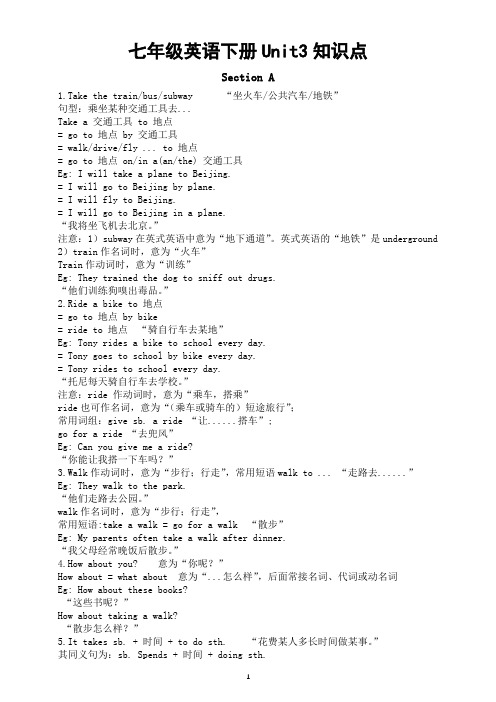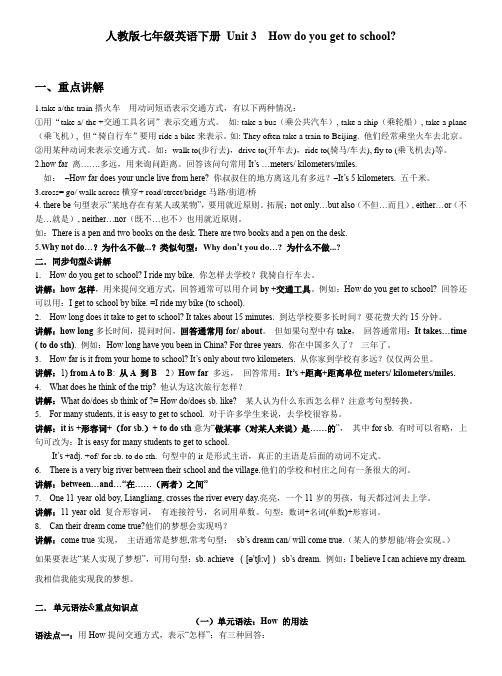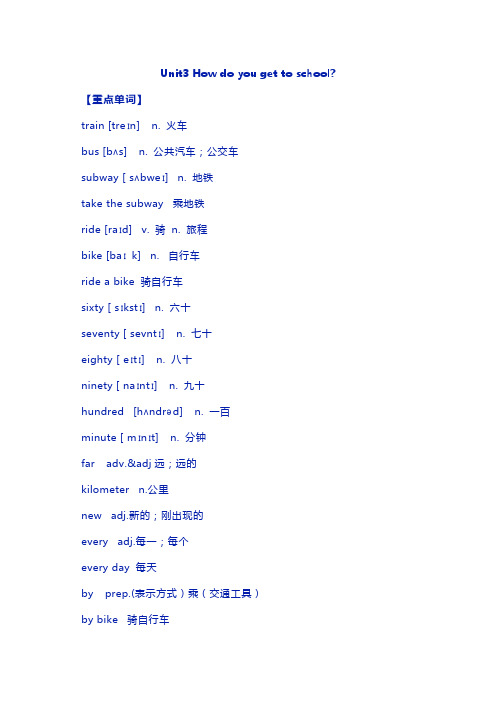人教版七年级下册英语Unit 3 知识点语法归纳总结
初中英语人教版七年级下册Unit 3 How do you get to school知识点

七年级英语下册Unit3知识点Section A1.Take the train/bus/subway “坐火车/公共汽车/地铁”句型:乘坐某种交通工具去...Take a 交通工具 to 地点= go to 地点 by 交通工具= walk/drive/fly ... to 地点= go to 地点 on/in a(an/the) 交通工具Eg: I will take a plane to Beijing.= I will go to Beijing by plane.= I will fly to Beijing.= I will go to Beijing in a plane.“我将坐飞机去北京。
”注意:1)subway在英式英语中意为“地下通道”。
英式英语的“地铁”是underground 2)train作名词时,意为“火车”Train作动词时,意为“训练”Eg: They trained the dog to sniff out drugs.“他们训练狗嗅出毒品。
”2.Ride a bike to 地点= go to 地点 by bike= ride to 地点“骑自行车去某地”Eg: Tony rides a bike to school every day.= Tony goes to school by bike every day.= Tony rides to school every day.“托尼每天骑自行车去学校。
”注意:ride 作动词时,意为“乘车,搭乘”ride也可作名词,意为“(乘车或骑车的)短途旅行”;常用词组:give sb. a ride “让......搭车”;go for a ride “去兜风”Eg: Can you give me a ride?“你能让我搭一下车吗?”3.Walk作动词时,意为“步行;行走”,常用短语walk to ... “走路去......”Eg: They walk to the park.“他们走路去公园。
Unit3重难点讲解与练习人教版七年级英语下册

人教版七年级英语下册Unit 3 How do you get to school?一、重点讲解1.take a/the train搭火车用动词短语表示交通方式,有以下两种情况:①用“take a/ the +交通工具名词”表示交通方式。
如: take a bus(乘公共汽车), take a ship(乘轮船), take a plane (乘飞机), 但“骑自行车”要用ride a bike来表示。
如: They often take a train to Beijing. 他们经常乘坐火车去北京。
②用某种动词来表示交通方式。
如:walk to(步行去),drive to(开车去),ride to(骑马/车去), fly to (乘飞机去)等。
2.how far 离…….多远,用来询问距离。
回答该问句常用It’s …meters/ kilometers/miles.如:–How far does your uncle live from here? 你叔叔住的地方离这儿有多远?–It’s 5 kilometers. 五千米。
3.cross= go/ walk across横穿+ road/street/bridge马路/街道/桥4. there be句型表示“某地存在有某人或某物”,要用就近原则。
拓展:not only…but also(不但…而且), either…or(不是…就是), neither…nor(既不…也不)也用就近原则。
如:There is a pen and two books on the desk. There are two books and a pen on the desk.5.W hy not do…?为什么不做...?类似句型:Why don’t you do…? 为什么不做...?二.同步句型&讲解1.How do you get to school? I ride my bike. 你怎样去学校?我骑自行车去。
人教版七年级英语下册-Unit 3:知识点复习总结+单元测试(word版,含答案)

Unit3 How do you get to school?【重点单词】train [treɪn] n. 火车bus [bʌs] n. 公共汽车;公交车subway [ sʌbweɪ] n. 地铁take the subway 乘地铁ride [raɪd] v. 骑n. 旅程bike [baɪk] n. 自行车ride a bike 骑自行车sixty [ sɪkstɪ] n. 六十seventy [ sevntɪ] n. 七十eighty [ eɪtɪ] n. 八十ninety [ naɪntɪ] n. 九十hundred [hʌndrəd] n. 一百minute [ mɪnɪt] n. 分钟far adv.&adj远;远的kilometer n.公里new adj.新的;刚出现的every adj.每一;每个every day 每天by prep.(表示方式)乘(交通工具)by bike 骑自行车drive v.开车car n.小汽车;轿车live v.居住;生活stop n.车站;停止think of 认为cross v.横过;越过river n.河;江many adj.&pron.许多village n.村庄;村镇between prep.介于…之间between…and…在……和……之间bridge n.桥boat n.小船Ropeway n.索道year n.年;岁afraid adj.害怕;惧怕like prep.像;怎么样leave v.离开dream n.梦想;睡梦v.做梦true adj.真的;符合事实的come true 实现;成为现实【重点短语】1. get to school 到达学校2. take the train 乘火车3. take the subway 乘地铁4. ride a bike 骑自行车5. how do you get to school 怎么到达学校6. one hundred and five 1057. how far 多远8. how long 多长时间9. it takes sb some time to do sth 它花费某人多长时间做某事10. ride the bike to school 骑自行车到学校11. walk to , drive to ,fly to…步行去…;开车去…;坐飞机去….12. every day 每天13. I’m not sure 我不敢确信14. about= around 大约15. 10 kilometers 十公里16. good exercise 好的锻炼17. drive his car to work 开车去上班18. in his father’s car 坐父亲的车19. need about 10 minutes to get to school 需要十分钟的时间到达学校20. what do you think of…=how do you like…你觉得怎么样21. cross the river 过河22. It is easy to get to school. 到达学校很容易。
人教版七年级英语下册Unit 3 重点知识点总结

人教版七年级英语下册Unit 3 重点知识点总结人教版七年级英语下册Unit 3 重点知识点总结Unit 3 Why do you like koalas?一、词组want to do sth .想要做某事want sb to do sth 想要某做某事want sth 想要某物Let sb do sth 让某人做某事d of 有几分种类a kind of 一种……years old …年龄如:ten years old 十岁like to do sth 喜欢做某事like doinglay with … 与...一起玩be quiet 安静during the day 在白天at night 在夜间have a look at.. 看…一个...另一个二、句型(1)、-why do you like pandas?-Because they’re very cu(2)、-Why dose he like koalas?-Becauare kindg.(3)、-Where are l?-Lions auth Africa.(4)、-What animals do you like?-I like elepha三、日常交际用语(1)、-Let’l(2)-Why do you walions?-Becaare very cu(3)-Do you like giraffes?I do./ No,I don’t(4)-Whaanimal do you like?_I like dog+ 名词的复数.表示没有特定的数量范围+名词的复数表示有特定的数量范围.(5)-Why are you looking at me?-Because you are very cu(6)-Let us play games. –Great!L。
Unit3知识点大汇总人教版英语七年级下册

Unit3SectionA知识点1.ride v.&n.(1)作动词讲,意为“骑”。
过去式为rode常用结构:ride a/one's bike骑自行车e.g.He often rides his bike to school.他经常骑自行车去学校。
(2)作名词讲,意为“旅程”常用结构:go for a ride去兜风give sb. a ride让某人搭车e.g. I guess it is about an hour's bus ride to get there.我想乘公交车到那里要大约一个小时吧。
Can you give me a ride to the supermarket?你能让我搭车去超市吗?I'd like to go for a ride.我想出去兜风。
2.hundred 一百(1)当表示具体的“几百”时,用“基数词+hundred”表示,注意此时hundred用单数形式,且其后不能加ofe.g.There are about eight hundred students in our school.我们学校大约有八百名学生。
(2)hundreds of 表示“数以百计的,成百上千的”,此时不能与数词连用e.g.There are hundreds of people in the restaurant.这家餐馆里有数百人。
【拓展】类似用法的词:thousand千million百万billion亿3.far adv.&adj.远;远的常用短语:far from离...远e.g.My home is very far from here.我家离这里很远。
How far is it from your home to school?从你家到学校有多远?【注意】far表示笼统、模糊概念的“远”,若要表示具体的“远”应该用away。
e.g.My home is 10 kilometers away from here.我家离这儿10千米远。
初中英语人教新目标七年级下册Unit3写作知识讲解

七年级英语下册Unit 3写作知识讲解【语法】(一)how用法总结:(1)How 用来询问方式方法:用来提问到达某地的方式。
句子结构为:How + do/does + 主语 + 谓语 + 其他?Eg: -- How do you go to school?你怎么去学校?-- I go to school by bike.我骑自行车去上学。
(2)How 用来询问身体健康状况:句子结构为:How + be动词 + 主语?Eg: -- How are you?-- Fine, thank you.--你好吗?-- 我很好谢谢。
(3)How 用来询问最近过得如何:句子结构为:How + be动词/do + 主语 + going?Eg: -- How do you get on with other students?-- Very well.--你和其他学生相处怎么样?-- 非常好。
(4)How 用来询问天气情况:句子结构为:How is the weather?Eg:-- How is the weather in Beijing?= What is the weather like in Beijing?-- It’s rainy.-- 北京天气怎么样?-- 有雨。
(5)How 用来引导感叹句:句子结构为:How + 形容词/副词 + 主语 + 谓语!Eg: How fast he runs!他跑得多快啊!(二)how与形容词副词搭配提问:(1)How many “多少”;用来提问可数名词复数Eg: How many students are there in your class?你们班有多少学生?(2)How much “多少”;用来提问不可数名词数及价格Eg: How much water do you need?你需要多少水?How much are these dresses?这些连衣裙多少钱?(3)How far “多远”;用来询问距离Eg: How far is your home from your school?你家离学校多远?(4)How long “多长时间”;用来询问时间长短或物体长度Eg: How long does it take you to get to school?你花多长时间到学校?How long is the ruler?这把尺多长?(5)How often “多久一次”;用来询问频率Eg: How often do you exercise?你多久锻炼一次?(6)How soon “多久之后”;用来询问时间段Eg: How soon will you be back?你多久回来?(7)How old “多大”;用来询问年龄Eg: How old are you ?你多大了?(8)How about “怎么样”;用来提建议或咨询建议Eg: How about this one?这个怎么样?【知识讲解】1.Drive作动词时,意为“开车;推动;驱赶”常用结构:drive sb.to 地点“某人开车去某地”Eg: My father drives me to school.“我爸爸开车送我去学校。
人教版七年级英语下册Unit3_单元要点梳理总结

Unit3 单元要点梳理总结重点短语1.学校旅行school trip2.去散步go for a walk3.挤牛奶milk a cow4.骑马ride a horse5.喂鸡feed chickens6.与农民交谈talk with a farmer7.照相take photos 8.问一些问题ask some questions9.种苹果grow apples 10.带某人逛/参观某地show sb. around11.学到许多learn a lot 12.摘草莓pick some strawberries13.上周last week 14.在乡村in the countrysidevisit my grandparents 16.去钓鱼go fishing15.拜访我的祖父母17.去爬山climb the mountains 18.参观博物馆visit a museum19. 画画draw pictures 20.去学校旅行go on a school trip21.礼品店gift shop 22.为某人买某物buy sth for sb.23.总得来说all in all 24.对……感兴趣be interested in...25.一点儿也不not...at all重点句型1.你见到奶牛了吗?Did you see any cows?2.我见到了而且见到了很多很多。
Yes, I did. I saw quite a lot.3.卡罗尔拍照片了吗?Did Carol take any photos?4.是的,她拍了。
Yes, she did.5.你好,Eric,上周旅游怎么样?Hi, Eric, How was your trip last week?6.精彩极了,我还去乡下看望了爷爷奶奶。
It was excellent. I visited my grandparents in thecountryside.7.我们玩得非常开心!We had so much fun!8.我也拍了好多精彩照片。
人教版七年级下册英语第三单元知识点梳理

人教版七年级下册英语第三单元知识点梳理Unit 3 How do you go to school一、词汇与短语◆重点单词◆重点句子◆重点单词变形二、语法知识点A部分知识点1.与how构成的词组引导的特殊疑问句❶ how表示爱好、程度、看法等,意为“……怎么样?”。
eg:—How do you like the music?你觉得这首乐曲如何?—I like it very much.我非常喜欢它。
How is your Chinese?你的汉语如何?How do you like China?你认为中国怎么样?❷用于询问身体健康状况,意为“……怎么样?”。
eg:How do you do?你好!How are you?你(身体)好吗?❸ how提问交通方式。
其答语分三种情况:◆take a/the+表示交通工具的名词◆by +表示交通工具的单数名词◆on/in+限定词+表示交通工具的名词eg:How do you go to workevery day? 你每天怎样去上班?I take the subway to work. 我乘地铁去上班。
=I go to work by subway.=I go to work in the subway.❹表示感叹。
eg:How cold it is today!今天好冷啊!How hard they are working!他们在多么辛勤地劳动啊!How fast he runs!他跑得多快啊!❺表示某种方式、手段或方法。
eg:How do you spell it?你怎样拼写它?How did he go to schoolyesterday?他昨天是怎样去上学的?How do you know about it?你怎么知道这件事的?❻ how about用于询问或征询意见等,相当于what about,后接名词、代词或动词的-ing形式,意为“……怎么样?”。
- 1、下载文档前请自行甄别文档内容的完整性,平台不提供额外的编辑、内容补充、找答案等附加服务。
- 2、"仅部分预览"的文档,不可在线预览部分如存在完整性等问题,可反馈申请退款(可完整预览的文档不适用该条件!)。
- 3、如文档侵犯您的权益,请联系客服反馈,我们会尽快为您处理(人工客服工作时间:9:00-18:30)。
人教版七年级下册英语Unit 3 知识点语法归纳总结Unit 3 How do you get to school?In this unit。
we will learn how to talk about n and how to describe our daily commute to school.1.Phrases to remember:Get to school: Arrive at schoolTake the subway: Use the subway as nRide a bike: Use a bicycle as nHow far: The distance een two placesFrom home to school: The distance een home and schoolEvery day: DailyTake the bus: Use the bus as nLeave Beijing for Shanghai: Depart from Beijing to Shanghaieful sentences:How do you get to school。
I ride my bike to school.How far is it from your home to school?How long does it take you to get to school?For many students。
it is easy to get to school.age:1) How to express n:How do you get to school?When describing n。
we usually use ns such as "by" (without "a/the").BusThink ofeen。
and。
An 11-year-old boyPlay with。
Come trueHave to (objective fact)Must (emphasize subjective n)Be afraid of somethingBe afraid to do somethingThere is no bridge。
[no]=not a(an)=not any3 hundred" (without "s")。
hundreds of (with "s")doing something (to。
doing something you are currently doing)to do something (to。
and do something else)2) Verb phrases using "take," "drive," and "ride":Take a/the bus/train/planeDrive a/the one's carRide a/the one's bike/bicycle表示“花费(时间/金钱)”,常用于询问或描述行程所需时间。
如:How long does it take to get to the airport?到机场需要多长时间?It takes me 30 minutes to get to work by car.我开车上班需要30分钟。
②get to表示“到达”,表示到达某个地方的动作,常用于描述行程的终点。
如:What time did you get to the party last night?你昨晚几点到派对的?I usually get to school at 8:00 in the morning.我通常早上8点到学校。
It takes me some time to explain how to improve this article。
It is important to pay n to formatting errors and delete any problematic paragraphs。
nally。
it is useful to understand the differences een words such as spend。
take。
cost。
and pay.When using take。
it is common to say "It takes [someone] [amount of time] to do [something]." For example。
"It takes him the whole afternoon to repair the car." Cost。
on the other hand。
is used to describe the price of something。
such as "A new computer costs a lot of money." Spend is used to describe how someone uses their time or money。
such as "I spend two hours on this problem"or "She spends money on clothes." Pay is used when someone is giving money in exchange for something。
such as "He pays $200a month for this apartment."When discussing arriving at a n。
it is important to understand the differences een get。
arrive。
and reach。
Get is often used with a n。
such as "How does he get to school?" Arrive is used whensomeone has reached a specific n。
such as "Lisa will arrive in Beijing next week." Reach is used to describe the act of arriving at a n。
such as "We finally reached the top of the mountain."Overall。
it is important to use the correct words and phrases when discussing time。
money。
and arrival at a n。
By paying n to these differences。
one can communicate more effectively and clearly.How did he get to the airport?Please arrive at the TV n on time。
Note that "reach" is a transitive verb and can directly take an object。
Generally。
n adverbs such as "here," "there," and "home" do not require any n after "get" or "arrive." For example。
"We will get/arrive there at nine."For many students。
getting to school is easy。
The sentence pattern "It is + adj。
+ (for sb.) to do sth." means "How is it for someone to do something?" It is a fixed sentence pattern。
and the infinitive verb can be used as the subject of the sentence。
but "it"is often used as the formal subject。
The "for sb." before the infinitive verb can sometimes be omitted。
For example。
"It's very important for us to study English well." "It is difficult to finish the work today."It's adj。
+ for sb。
+ to do sth." and "It's + adj。
+ of sb。
+ to do sth." are different。
The former is often used to describe objective ns。
while the latter is used to describe a person's character or morality。
For example。
"It's very hard for him to learn two languages" and "It's very nice of you to help me."It's very kind of you to help me with my English。
Note that when using pronouns or nouns as the subject after a n。
the n should be placed before the pronoun or noun.You are very helpful in improving my English skills.I can easily distinguish een the two words.There is a very big river that separates their school from the village.Among the trees is where his house is located.He is not afraid because he loves going to school.Is it possible for their dream to e a reality?Their dream can come true if they work hard enough.are you?你多大了?)how are you?你怎么样?)how do you feel?你感觉怎么样?)how much/many多少)拓展:how much用于不可数名词,how many用于可数名词例:--How much money do you have?--I have $50.How many books do you have?--I have 10 books.改写:e on(加油;快点)、come back(回来)、come over(过来;顺便来访)、come in(进来)e out(出去;出版)。
